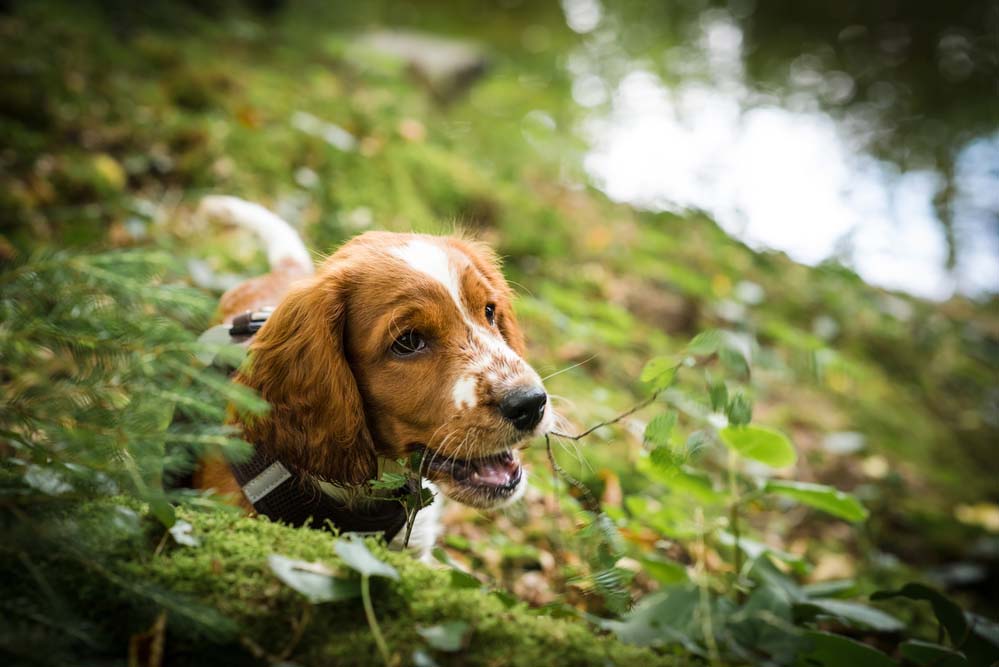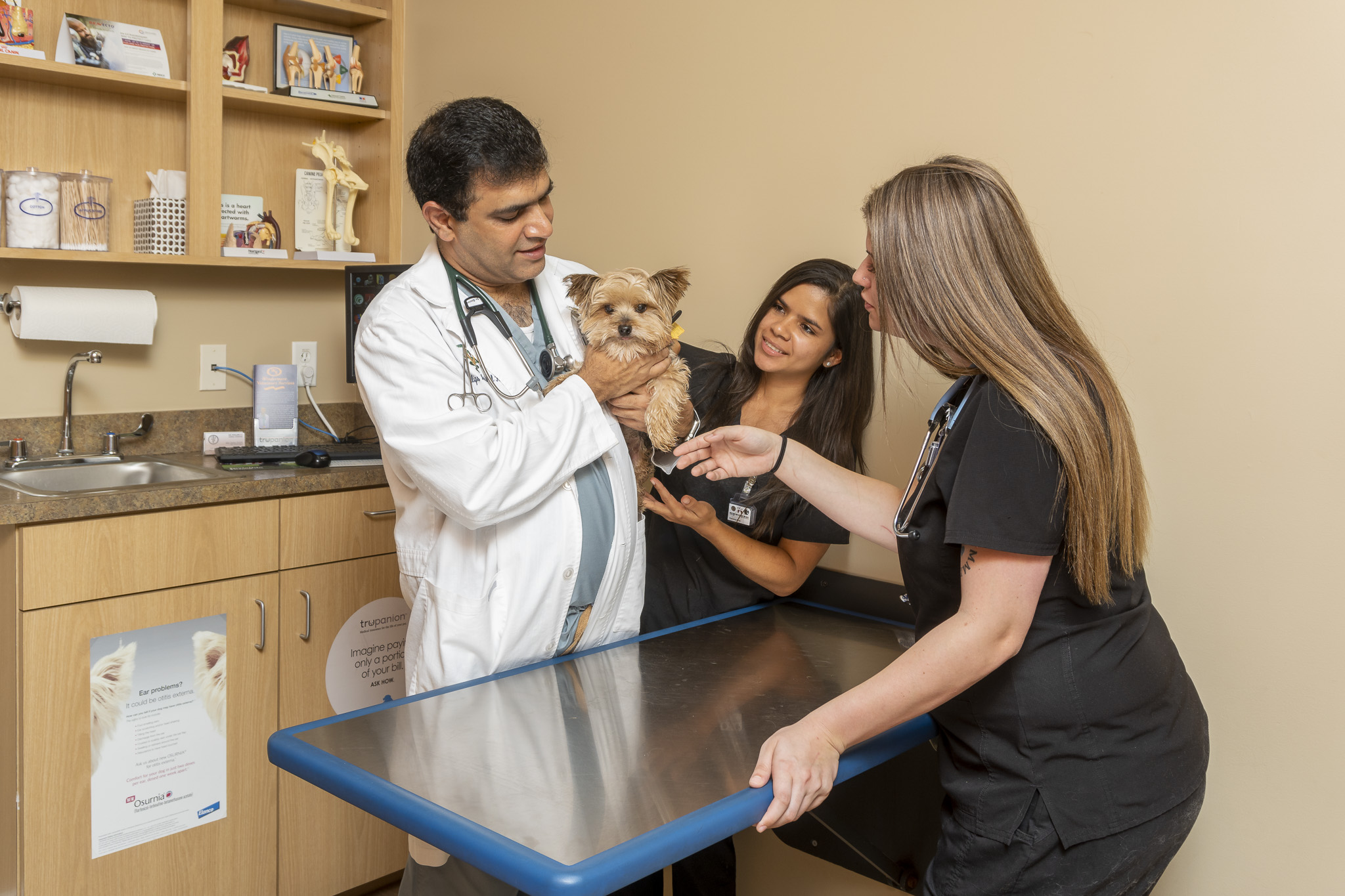
We're here for you
Emergency?
If your pet is exhibiting concerning symptoms or experiencing a medical emergency, please call our clinic at (407) 352-2579. We’ll help you through it.

Dogs might eat dirt for a variety of reasons. It could be a sign of a nutritional deficiency and that they’re missing certain minerals from their diets. Some dogs might eat dirt out of boredom or simply to alleviate an upset stomach. Some, especially puppies, are just curious about the world and use their mouths to explore everything from other animals to plants to dirt and more.
Some reasons for eating dirt are perfectly normal and aren’t a sign of anything bad. Other times, eating dirt can be a symptom of a medical problem. If your furry friend makes a habit of eating dirt, however, it’s a good idea to consult with your vet to rule out any health problems.
Common Reasons Dogs Eat Dirt
The following are some reasons your pet may be eating dirt:
- Nutritional Deficiency: A lack of certain essential minerals and nutrients in their diet can lead to some dogs seeking out alternate sources of nutrition, including dirt.
- Boredom: Dogs can get bored, just like humans can. Digging in and eating dirt may be a way they seek to entertain themselves.
- Exploration: Dogs use their noses and mouths to explore the world around them. They may just find the dirt to be something interesting in their environment.
- Upset Stomach: If your dog has an upset stomach, they may eat dirt as a way to try to induce vomiting to alleviate the discomfort.
- Pica Behavior: Pica is a behavioral condition in which a dog eats items that are not food. Dirt could be one of these non-food items.
- Instinctive Behavior: Dogs may have an instinct to eat dirt because of a natural behavior to seek out minerals that may be contained in it as wolves might do in the wild.
- Scent: Dogs see much of the world through their noses, so if something in the dirt smells good, they may try to eat it.
- Medical Issues: Medical conditions like gastrointestinal problems or parasites might lead a dog to eat dirt.
How To Stop Your Dog From Eating Dirt
Eating dirt may not be a desirable behavior. The following are some methods you can use to address the problem and prevent your pet from eating dirt.
Step #1
Take Your Dog to the Vet
The most important thing to do if your dog is eating dirt is to rule out a medical issue. If your dog has suddenly changed their behavior, book an appointment outside of your regular vet visits to make sure they aren’t ill. If your dog’s dirt-eating is caused by a medical condition, early detection is essential to ensuring the best possible health outcomes.
What Medical Conditions Can Cause a Dog To Eat Dirt?
Dogs that suddenly start eating dirt when they didn’t before could be suffering from a medical condition, such as one of the following:
- Gastrointestinal Disorders: Conditions such as inflammatory bowel disease (IBD), gastritis, or other gastrointestinal issues can lead to discomfort, prompting a dog to seek relief by eating unusual substances, including dirt.
- Parasites: Intestinal parasites, such as worms, may cause irritation and discomfort in a dog's digestive system, leading them to eat dirt in an attempt to alleviate the discomfort.
- Pancreatitis: Inflammation of the pancreas can cause digestive upset and may influence a dog's eating habits.
- Liver Disease: Certain liver conditions can impact a dog's appetite and behavior, potentially leading them to eat dirt.
- Exocrine Pancreatic Insufficiency (EPI): EPI is a condition where the pancreas doesn't produce enough enzymes for proper digestion, leading to malabsorption of nutrients and potential dirt-eating behavior.
- Diabetes: Dogs with diabetes may experience changes in appetite and eating habits, which could include eating dirt.
- Thyroid Issues: Hypothyroidism, an underactive thyroid, can affect a dog's metabolism and may result in changes in behavior and eating habits.
Step #2
Ensure Your Dog Is Eating a Balanced Diet
If your dog is otherwise healthy, the next step is to check your dog’s diet. You can also ask your vet for recommendations and advice to ensure that your dog is getting a balanced diet with all of the essential vitamins and minerals that will make them less inclined to eat dirt.
Step #3
Increase Your Dog’s Mental and Physical Stimulation
If your dog is eating dirt out of boredom, then they may require more stimulation. This could mean more walks and playtime. The more tired your dog is, the less energy they’ll have for undesirable behaviors.
Step #4
Teach Your Dog Basic Commands
Every dog should have at least some training, even if it’s just basic commands. This can ensure that your dog listens to you when needed. You can include a specific command that your dog stops eating or drops something in their mouth in your dog’s repertoire. Make sure to reward your dog whenever they correctly follow your commands. Treats can praise can go a long way.
Step #5
Distract Your Dog When They Start To Eat Dirt
Anytime your dog is starting to eat dirt, try distracting them or redirecting their attention. This could be with toys, a game with you, or commands. If they’re eating dirt out of curiosity, give them something like a chew toy that they’ll be more interested in.
Step #6
Consider Consulting With a Professional Trainer
If your dog continues to eat dirt and nothing else you’ve tried thus far has gotten them to stop, then consider consulting with a professional trainer. They’ll know the best techniques for training dogs and can teach you how to properly use commands and train your dog. Dog training is as much for dog owners as it is for the dogs!
When in Doubt, Contact Your Vet
If you observe persistent or concerning dirt-eating behavior in your dog, it's crucial to consult with a veterinarian. They can conduct a thorough examination, run diagnostic tests, and determine if there's an underlying medical condition contributing to the behavior. Early detection and appropriate treatment can help address the root cause and improve your dog's overall health.

Step One:
Call us to book your pet’s appointment.

Step Two:
Our expert vet will take care of all of your pet’s needs.

Step Three:
Get back to enjoying your happy and healthy life with your furry best friend.

Get the Best Care for Your Pet
Come Visit Dr. Qasim
Book your pet’s appointment with Dr. Qasim to ensure a long, happy life together.

We love and care for each patient as if they were our own pet.
Meet Our Team of Animal Lovers
Dr. Bilal Qasim, DVM, established Dr. Phillips Animal Hospital in 2011 after practicing veterinary medicine for over 17 years with the help of talented and caring veterinary technicians.


